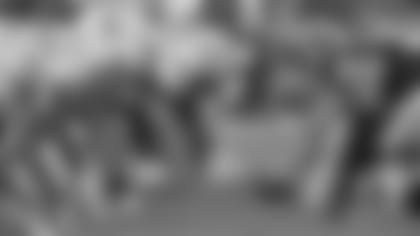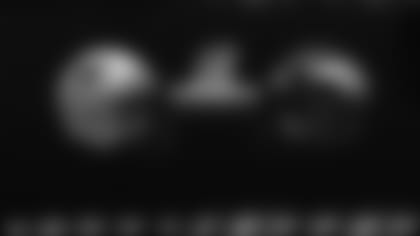COMMISSIONER GOODELL: Good afternoon. I think you all are aware of the fact we met for approximately three hours and 15 minutes this morning with Matt Walsh and his counsel, Michael Levy. Joining me in the meeting were Jeff Pash, Milt Ahlerich, our director of security, Gregg Levy, and the Patriots had an attorney there, Dan Goldberg.
I think you all have seen the tapes. If you want to see them again, we'll do it right now. Anybody want to see them again? I guess not.
We started the meeting, I thanked Matt for coming and told him how important it was for the league to understand all of the details and all of the facts and whether he could share anything with us. I think he was responsive, and I think he was well prepared.
There have been really basically two developments since last fall when this issue came to the public light after we discovered the violation of the first game of the regular season. The first was that Matt Walsh was reported to be somebody that potentially had new information that we were not aware of, and as you all are aware of, I said from the get-go if there was new information, I reserved the right to go ahead and revisit the situation.
The second was that the Patriots had taped the Saturday walk-through just prior to Super Bowl XXXVI against the Rams.
Today, we were able to confirm the details of his activities while he was a Patriots employee. As you know, he was in the video department and he was in the scouting department for a short time and was an intern in the public relations department.
The fundamental information that Matt provided was consistent with what we disciplined the Patriots for last fall – that essentially they were taping coaches' signals against NFL policy.
We were also able to verify that there was no Rams walk-through tape; no one asked him to tape the walk-through; he's not aware of anybody else who may have taped the walk-through. He had not seen such a tape. He does not know of anybody who says there is a tape. He was in the building at the time of the walk-through, along with other Patriots video personnel. They were doing their job prior to the game. He, in fact, was even on the sidelines in his Patriots gear while the Rams were practicing. So it was clear that it was not an overt attack or addressing access into the Rams walk-through.
In addition, he confirmed he was aware of no other violations of league policy by the Patriots or anybody associated with the Patriots. There was no bugging of locker rooms. There was no manipulating of communication systems. There were no crowd noise violations of anywhere that he was aware of. No miking of players to pick up opposing signals or audibles. So we were able to confirm that the Patriots had followed NFL policy as far as he knew other than the taping of coach's signals.
Two new pieces of information that we did pick up in the three hours that were of note: One is that they had a tape of – he indicated that there was a tape at one point in time of a player inappropriately practicing. He was a player that was on injured reserve. He practiced, I believe, back in 2001. He identified the player. We're verifying that. So that is something that we have been looking into.
I would tell you up front, though, that the way we normally handle those matters, those are a matter of a team fine, if they are verified, and then they are handled on that basis. I would expect that if we were to verify it, that I would consider it part of the fine that I implemented against the Patriots, close to $750,000 between the Patriots and Bill Belichick, and I would not take any further action on that. But we will be verifying that.
And the second was a non-competitive issue, which was the scalping potentially of Super Bowl tickets by players. He said that he was the one that sold the tickets. He said it was limited to four or five a season over two seasons, so I think somewhere between eight and 12 was the number he finally used. We will be looking into that, of course, also, and that was a non-competitive violation but something of importance to us.
I think that was it as far as comments but I know you have questions so I'll be happy to take them.
Is Spygate closed as far as you're concerned?
Well, I think as I stand before you today, and having met with Matt Walsh and over 50 other people, I don't know where else I would turn. I asked him that question, and he responded very clearly: I don't know of anybody else who may have information. And as I say, we've conducted over 50 interviews. I don't know where else I would turn. I always said, as I've said to you before, that I reserve the right if new information comes up, I will look at it. That's my responsibility.
Did he say why he kept the video tapes?I asked him that, Gary, more than once, and he had some different answers to that. He said that he potentially may want to go into coaching some day, so that he, from time to time, had kept tapes of various drills and practices, which he did on a regular basis. He did not know whether he had those tapes. And the second issue with respect to these tapes – he said he someday may need something for his resume to indicate the types of things he did as a Patriots employee and he would have some evidence of the work that he did. Those were the answers he gave me.
Can you talk about the process, who saw the tapes and how they were used, and if they used the tapes during games?Yes, in fact, he very definitely said they did not. He was very specific that the tape remained in his possession the entire game and that they were not used during the game. So he specifically addressed that issue at our request.
The process – who saw the tapes, how were they used and how much of an advantage do you think they were?In great detail we spoke about it. Basically, he would videotape as part of his responsibility during the game. He would then take the tape, mark it and then hand it off to Ernie Adams, and then he had no knowledge of where it went from there.
Impact on games?Again, according to NFL policy, it is permissible to scout people's coaching signals, and as you know, clubs go to great lengths to protect those. They change them frequently and they change them during the game. So I think that teams are sophisticated enough to know that that's a possibility and they go to great lengths to address them. But it's impossible to know the specifics about how much impact it has. I believe that, to me, that there is a permissible way to do this; that they prepare for that.
Did you discuss the Super Bowl XXXVI walk-through with the Rams? Did he tell you at all whether he was instructed to stay behind and look or watch for anything?He said he was not instructed to do that; that they were there in the normal part of their responsibilities to make sure that they were prepared to do their duties the next day; that people saw them; they were walking around in Patriots gear; and he was not instructed to tape the walk-through by anybody.
Did you ask whether he had any qualms about not coming forward when the allegations were out there, right before the Super Bowl?Do you think I asked him about that? (Smiling).
I did, very specifically. His answer to that, basically what he stated to me, and those that were in the room, is that he did not want to be part of this publicly in any way. He did not want to provide any information as it relates to this issue. He was trying to be consistent, was the word he said to me, with all of the media that were approaching him. And he said he had dozens of people in the media that came over to Hawaii, in fact, to see him, that were inquiring about the story. He wanted to be consistent and not say yes or no before responding to any specific allegation. Once he did that, he felt that he had to respond on other matters.
What about you?He never called me. I was never able to reach him. I didn't know about Matt Walsh until the Friday before the Super Bowl.
Before the Super Bowl, he's quoted as saying that he had information that people would have to answer to. What was he specifically talking about there?Well, we talked a little bit about that, Judy. I think the best way for me to answer that would be, he did not feel it was well known publicly that the taping had gone back to 2000, and that he felt that there was misinformation or not enough knowledge of that, and that's what he referenced.
Will there be any further sanctioning of the Patriots?I don't anticipate it, Peter. As I said, I think the fundamental information that was provided today is consistent with what we knew last September, and that the discipline that I took was unprecedented at that time and I feel it was appropriate.
If you're assuming Matt will give the same story to Senator Specter today that he gave you, do you feel that Senator Specter may change his mind regarding your investigationThat's up to Senator Specter to respond to, not me.
At what point did Bill Belichick tell you that this taping actually went back as far as, you know, 2000? Did you know that when you handed out the penalty?I did, Gary, from this standpoint; and I think we said this up front. Bill Belichick's interpretation of the rule was that this was permissible, as long as he did not use it in the same game. So my interpretation is he's always had that interpretation of the rule and that he had done this while he was the head coach of the Patriots. That was very clear to me.
Handing out the penalty, I don't think it was made clear perhaps that this had extended back any further than a couple of years.Well, Gary, the only point I would say to that one, and obviously there could have been more information, but it was clear that it was not just an isolated incident with the Patriots because we had other tapes from the Patriots. So we knew it had happened in prior seasons and we knew that there were multiple tapes, which all of you know because we discarded those tapes the next week.
But you handed out the penalty before --Because I knew what they had. They told us in advance. Part of my decision, the first step -- we should just reverse a little bit here. We were the ones that discovered this violation. We were notified that somebody was on the sidelines that appeared to be taping coaches' signals. Our staff apprehended the camera and the tapes and brought them back to the office. I then reviewed them on Monday morning with our staff. So we're the ones who discovered it and we disclosed it later in the week and disciplined in an unprecedented fashion. We did that quite quickly. At that point in time, they had admitted to the violation. Bill had told me at that point in time his interpretation was that it was permissible to do, as long as he didn't use it in the same game. So I was comfortable that I understood that this had been a practice that he engaged in and that I was disciplining and that's why we used the language originally "for the totality of the acts". That was the issue.
Have you been in contact with the Patriots since your meeting with Matt Walsh this morning, and if so, what was their reaction?I have not. As I said, the Patriots' attorney, Dan Goldberg, was in the meeting.
Do you plan on contacting the Patriots today?I may. I don't have any plans to.
Are these tapes now the property of the NFL and if so, what are you going to do with them?You've seen them all.
Does Walsh have copies?I believe the attorneys have worked out the actual possession of the tapes.
Did Matt Walsh tell you that he thought what he was doing was a violation of league policy?I asked that question. Yes, I think that it was very clearly known, at least by Matt, he believed, and he stated to us, that it was very clear that he had to be careful that nobody discovered what he was doing; that he was very cautious about when he did it, who was watching. And there are certain places where he didn't get access during the year. A lot of teams said we are not going to allow another camera up here on the third level or the end zone level. So I think he believes, according to Matt, they were well aware this is something that shouldn't be done.
So Belichick knew it was a violation?I'm pretty well on the record here that I didn't accept Bill Belichick's explanation for what happened, and I still don't to this day.
The tape he was giving to Ernie Adams, wouldn't it have some value, more than minimal value to the Patriots at that point?I don't know if any of us can say what the true value of it really is. I think the reality of it is, somebody asked me at Super Bowl, and I believe because of the extensive steps that teams take to prevent people from taking their signals, that teams are well prepared for that so they don't allow that to have a big impact on the outcome of the game. They recognize that it is permissible in our rules to scout signals as long as you don't videotape them. Obviously teams are always trying to find a competitive edge. That's why we have these competitive rules, and that's why it's my job to enforce all of those rules. That's what I did here.
Did you personally review the tapes turned over in September?I did not personally review all six of those tapes. Four or five our staff went up in September and looked at them and they were extremely consistent with what you saw today.
Did you see any?I saw the one tape, the Jets tape.
Was there any discussion with Matt Walsh about the fact that other teams either have been doing this or are doing this, and it was a widespread practice, and did he implicate any other teams?He did not. And my recollection of the meeting this morning, we did ask him the question. He stated that he was not aware of anybody else doing it. He said at one point in time, he became suspicious that one other team might have been doing a similar thing, but he had no verification of that at all.
You mentioned that Matt was told he had to be careful about what he was doing. Who is telling him to be careful? How did this line of ordering go?It appears it was his supervisor, Jimmy Dee. His communication and his management was dictated by essentially Jimmy Dee, who was the head of the department. So Jimmy Dee gave him most of his instructions. Once in a while, I guess Ernie Adams gave him some instructions but it was very infrequent, he said.
That said, did he specify any teams he was ordered to tape?Just so we can be clear here, what he essentially said as far as tapes or games that would be taped, they were opponents that they expected to play again later in the season, so primarily division opponents.
What was Matt doing during the Rams walk-through while he was out there?They were setting up their operation. They have printers and they have cables that they have to set up. And, in fact, as part of the investigation that Matt was not aware of, but we were told, and very clearly, by our operations people and also the Patriots verified it, that there were actually changes the day before the game. So they had to reestablish some of those communication systems.
Do you find it unusual that a member of the opposing team would be out there during a walk-through?No. The only thing I probably found a little unusual is that he was standing on the field in his Patriots gear.
Was there any indication that the Rams were on the field during the Patriots walk-through, any Ram people?I don't know that. I did not ask that question. I know that the Patriots went first in their walk-through.
One other thing, just to clarify. Did Matt Walsh have any contact with Bill Belichick that he told you about during the time?No. He actually described him at one point as "the man behind the curtain," someone that they just didn't see very often and he didn't have any direct relationship with or contact with.
Are there any questions that Matt Walsh's attorney would not allow him to answer that you asked him?Yes, I think you all got the agreement, so there were questions and topics in advance that they did not want to address and we respected that.
Was this a surprise, or were you aware of the taping of offensive signals?Well, I assumed that it may have happened. They identified -- Matt identified three times that it could have happened. He was certain of one game. He was more certain of a second game and maybe a little uncertain about the third game, but I'll assume that it was three games. But I think that was in the context of the fact that the rule is about taping offensive or defensive signals, and that's what I believe I disciplined for. And one other thing I should point out. It was quite clear, and I think you saw the tape with Miami, did you not? So I don't believe those were the plays; those were personnel groupings. So they indicate whether it's a two-tight-end-set, four-wide-receiver-sets; that's the type of thing that you saw. And he confirmed that, by the way.
You said earlier that Walsh didn't want to come forward and say he didn't have a Rams walk-through tape because he didn't want to go to the media and whatnot?That's what he said.
Did you ask him or would you have anticipated that he might have – should have – defused this at least through his attorney to let you know that tape didn't exist? And the other thing I was going to ask, was it worth waiting the three and a half months to speak to him today?Well, I don't think he had an attorney until sometime around the Super Bowl. When we first started to try to reach him immediately around the Super Bowl when his name first arose, I think it was at that point in time we were told that he's getting an attorney and we would have to contact him through the attorney. So I'm not sure the attorney was able to give him any advice in advance. After the Super Bowl, I didn't get into specifics on that. The attorney was there. He seemed to corroborate that he wanted to be consistent with the media. He said the media was extremely aggressive about trying to reach him, almost to the point where it was difficult for him to do his job. And the second part, what was your second part?
I know you talked about the media, forget about that part, but just getting the word to you that that tape didn't exist.They had no interest in doing that obviously.
So it was worth the three and a half months to talk to him?I think it is because I think this is important. You're dealing with the integrity of the NFL. You're dealing with the public trust in our games for our fans. There's obviously been widespread media speculation. There have been reports of violations going from miking to tapings of walk-throughs. And I think the general interest from the public was we want to know the facts and wanted to know the facts, so that's why we are here today to give them to you.
Do you believe everything that Matt Walsh told you? Is there anything that you doubted in his answers?I think as far as the fundamentals and the things that I was concerned about and the competitive issues and what transpired, as I said, we did 50-plus interviews so we had quite a bit of information. We obviously didn't share that with him, but we have to put that up against the information that we have, and I think on the fundamentals, it was consistent with what we were told.
How much time was spent watching versus questioning?We didn't watch any tape during the meeting. We watched all of that in advance.
You mentioned the league has the original tapes. Do you have a sense that there's a misconception that the Jets caught the Patriots versus the league caught the Patriots?The Jets alerted the NFL that there may be somebody over there who is inappropriately taping signals of coaches and our personnel went over, apprehended the individual, apprehended the equipment and the tape and took the camera and the tape into our office.
Was it unusual that you were there to be alerted or were you there to be --I wasn't there.
The NFL crews, I mean.We always have somebody at a game. I credit our staff for being aggressive. There was resistance, to say the least, and they persevered and they got the information and we have it, and I think that's why we have the important step that we took to make sure that the integrity of the game is respected by all our clubs, and it's one of the reasons why I responded so quickly. I wanted all 32 teams to know: you play by the rules.
The Jets were the ones that blew the whistle --Yes.
There are people who believe that Bill Belichick should have been suspended for what he did. Looking back on the entire experience now dating back to September, having met with Matt Walsh, are you comfortable with the punishment handed out to the Patriots?Absolutely. I think it was appropriate. I think it was unprecedented, which it should be. I think it sent a loud and clear message, not only to the Patriots but to other clubs -- play by the rules.
How widespread a practice do you think videotaping coaching signals has been in the NFL over the last few years?I don't think it's widespread. I think it's very limited, Peter. I said that before. I think that the benefit of it, you've heard coaches, former coaches, that have said, I tried that, I just didn't see any benefit. I think it's very limited in its practice and its effect.
Why didn't you show the tapes like this last September?There's a very significant difference. We are not in the middle of a season. We were in the second week of a season where those tapes potentially could have had competitive consequences, so that is not something we do. We don't even talk to our Competition Committee about various matters during a season. Those are matters we deal with post-season, which is why I gave them a full update in February, which is our first opportunity to get together with them.
Based on all your investigative reporting in today's meeting, how confident were you that he was not going to tell you anything that would lead to more sanctions for the Patriots?I'm not sure I fully understand the question, but let me answer it this way. I was not fully confident of what he was going to tell me. We had no indication of what he was going to tell us, what he was going to bring forth. We tried to create an environment where he could come forth with as much information as possible, and I think he did feel comfortable. At the end we asked a number of general questions: Is there anything else we should ask? Is there anything else we should know? Are there any other areas of violations we should cover? And I think he was very satisfied that he was thorough, and so was his attorney.
Did you get a sense that he came to the meeting still thinking he had something significant to change your mind about the investigation?You're going to have to ask him that question. I'd be guessing. I just met him this morning.
Just to clear up, are the Patriots going to be penalized any more, and is there going to be anything done to prevent this in the future?Well, we have done a number of things to prevent this in the future. As you know, we took some very aggressive steps in this off-season – certification by employees with respect to knowledge of any violations. We passed, as you know, the defensive communication system so that the coach and the defensive player can communicate. So we have taken a number of aggressive steps that we think will raise the profile, and most importantly, will ensure the public that teams are playing in a fair and level playing field.
On ticket scalping, was it during years that the Patriots were actually playing in the Super Bowl, scalping Super Bowl tickets, and were there active Patriot players?Yes. He said, I believe, it happened over a two-year period while he was there. So my assumption was the 2000-2001 season.
But you will be following up on that?Yes, and he gave us some additional details which we wouldn't release now but we will pursue.
Did he name names?Yes, he did.
Could there possibly be disciplinary action against those people?Yes, we have disciplined for that in the past, as you know. So if we find a violation there, obviously this is just an allegation, but we'll take it seriously, believe me.
How many tickets were involved?He said 12 tickets over the two years. Okay. Thank you.






































